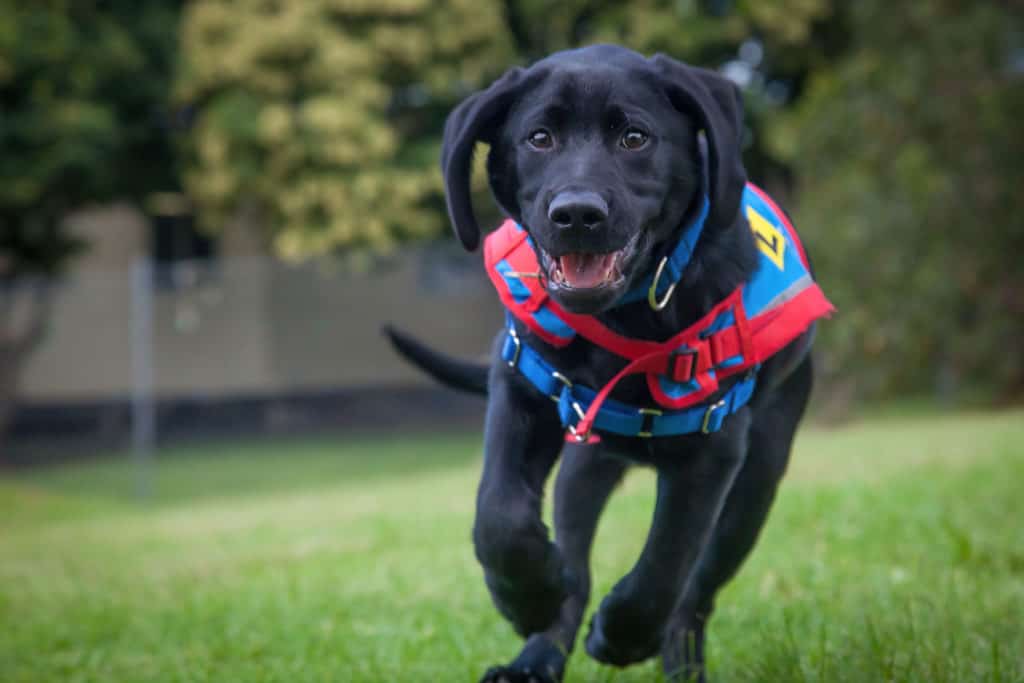This post may contain ads and affiliate links and we may earn a small commission when you click on the links at no additional cost to you. As an Amazon Affiliate, we earn from qualifying purchases. You can read our full disclaimer here.
17 Frequently Asked Questions about Service Dogs – and the Answers!

Do you have questions about service dogs? We have the answers!
Service dogs are specifically trained to give assistance and help to people with disabilities. They can perform a variety of tasks, such as helping someone who is blind or has low vision navigate their surroundings, or providing support to someone who has a mobility impairment.
Service dogs can also be trained to perform specific tasks for people with other types of disabilities, such as autism or PTSD.
A service dog is a dog that has been specifically trained to provide assistance to people with disabilities. Service dogs can perform a variety of tasks, depending on the needs of the person they are assisting.
People often have questions about service dogs and how they can help people with disabilities. Here are 17 answers to some frequently asked questions about service dogs:
1. What breeds of dogs are used as service animals?
Labrador Retrievers, Golden Retrievers, German Shepherds, and Standard Poodles are some of the most popular breeds used as service dogs. However, any breed of dog can be trained to perform certain tasks that assist people with disabilities.
For example, smaller breeds such as Miniature Poodles and Cocker Spaniels can be used as service dogs for tasks like retrieving small items, alerting to seizures, and calming someone with PTSD or anxiety. Some service dogs are even mixed breeds!
The most important thing to look for in a potential service dog is not the breed, but rather whether or not the individual dog has the right personality and disposition to be trained for the specific job needed.
2. How old does a dog have to be to become a service animal?
There is no set age requirement, but most service dogs in training begin learning basic obedience commands and socialization skills around 6-8 weeks of age.
Some organizations that train service dogs start with puppies as young as 8 weeks old, while others wait until the dog is a bit older, around 1-2 years old. The age at which a dog begins training may depend on the specific organization’s guidelines as well as the individual dog’s needs and learning abilities.
In general, it is important to start training early so the dog has ample time to learn all the necessary skills.
3. What is the difference between a therapy dog and a service dog?
Service dogs are trained to perform specific tasks that assist people with disabilities, such as guiding someone who is blind, alerting to a seizure, or calming someone with PTSD. Therapy dogs provide companionship and emotional support to people in hospitals, nursing homes, schools, and other settings.
Service dogs must be individually trained to perform specific tasks for their disabled handlers. In contrast, therapy dogs do not need to be individually trained and can provide comfort and companionship to anyone in their community.
Service dogs are protected under the Americans with Disabilities Act (ADA), which requires businesses to allow them access to public places. Therapy dogs are not protected under the ADA.
4. What tasks can service dogs perform?
Service dogs can be trained to perform a variety of tasks that assist people with disabilities. For example, service dogs can be trained to:
- guide someone who is blind or has low vision
- alert to a seizure and help the person stay safe during and after the seizure
- retrieve items for someone who uses a wheelchair
- provide balance assistance for someone who has difficulty walking
- calm a person during an anxiety attack or PTSD episode
- and much more!
5. How long does it take to train a service dog?
It typically takes 2-3 years to train a service dog. However, the amount of time it takes may vary depending on the individual dog’s learning abilities as well as the specific tasks that need to be learned.
Some dogs may learn basic obedience commands and socialization skills more quickly than others. It is important to give each dog the individualized training and attention they need in order to learn all the necessary skills.
6. How much does it cost to train a service dog?
The cost of training a service dog varies depending on a number of factors, such as the organization you are working with, the specific tasks that need to be learned, and the individual dog’s learning abilities.
In general, it costs around $20,000 to $30,000 to train a service dog. However, some organizations may charge more or less depending on their specific training programs.
7. Where can I get a service dog?
There are a variety of ways to get a service dog. You can purchase one from a breeder, adopt one from a shelter or rescue organization, or get one through a service dog training program.
If you are interested in purchasing a service dog, it is important to do your research and find a reputable breeder. Make sure to visit the breeding facility and meet the parents of the puppy you are interested in adopting.
If you are interested in adopting a service dog, there are many great organizations that place rescue dogs into homes. These organizations typically have a lengthy application process and require a home visit before approving an adoption.
Service dog training programs place puppies or young dogs with families who agree to raise and train the dog until it is ready.
8. Are there any restrictions on what types of businesses can accept service animals?
The Americans with Disabilities Act (ADA) requires businesses to allow service animals access to public places. This includes all types of businesses, such as restaurants, hotels, stores, hospitals, and more.
9. Can businesses ask questions about service animals?
Yes, businesses can ask questions about service animals. However, they are only allowed to ask two types of questions:
- Is this a service animal required because of a disability?
- What type of tasks or work has the service animal been trained to perform?
Businesses cannot ever inquire about the person’s disability, require medical documentation, or ask the person to remove the animal from the premises.
10. What should I do if I see a service dog with its owner?
If you see a service dog with its owner, it is important to refrain from petting the dog or interacting with it in any way. Service dogs are working animals and should not be distracted while they are on duty.
If you have any questions about service dogs, it is best to ask the owner. They will be happy to answer any questions you have and explain how their dog helps them.
11. Can service dogs be left alone?
No, service dogs cannot be left alone. They are working animals and need to be with their owners at all times.
If you are going to be away from home for an extended period of time, you will need to make arrangements for someone to care for your service dog. This can be a friend, family member, or professional dog sitter.
12. Do service dogs have to wear a vest or other type of apparel?
No, service dogs do not have to wear a vest or other type of apparel. However, many owners choose to do so as it helps identify their dog as a working animal.
Some service dog training organizations provide vests for their dogs, while others sell them separately. You can also find vests and other types of service dog gear online or at pet stores.
13. Can service dogs be trained to perform multiple tasks?
Yes, service dogs can be trained to perform multiple tasks. This is often done if the person’s disability requires multiple types of assistance.
For example, a service dog might be trained to help with physical tasks such as opening doors and picking up dropped items. They might also be trained to perform tasks such as providing deep pressure therapy or alerting their owner to an impending seizure.
14. Do service dogs have to be certified?
No, service dogs do not have to be certified. However, many organizations that place service dogs will only do so if the dog has been certified by a reputable training organization.
Certification is not required by law, but it can help demonstrate that a dog has received the necessary training to perform its duties.
15. If a city has a law that bans certain dog breeds, does that law apply to service animals?
No, laws that ban certain dog breeds do not apply to service animals. This is because service animals are not considered pets, they are working animals.
Laws that ban certain dog breeds are often called “breed-specific legislation” or “BSL.” BSL is controversial and often criticized by animal welfare organizations and disability rights advocates.
16. What are the penalties for misrepresenting a dog as a service dog?
There are no federal laws that address this issue, so the penalties will vary from state to state. In some states, it is a crime to misrepresent a dog as a service animal, while in others it is only considered a civil offense.
The penalties for misrepresenting a dog as a service animal can range from a fine to jail time. In some states, the penalties are more severe if the person is found to have committed fraud or to have caused a disturbance with their fake service animal.
17. Can service dogs be used in place of emotional support animals?
No, service dogs and emotional support animals are not the same things. Service dogs are working animals that are trained to perform specific tasks for their disabled owners.
Emotional support animals provide companionship and emotional comfort, but they are not trained to perform any specific tasks.
Conclusion to Questions About Service Dogs
Service dogs are amazing animals that can provide vital assistance to disabled people. They are specially trained to perform tasks that their owners cannot do on their own, and they are an important part of many people’s lives.
If you have any questions about service dogs, be sure to ask the owner before approaching the dog. And if you ever see a service dog working, remember to respect the animal and give it space to do its job.
-

Coffee Mug – In Dog Coffees I’ve Only Had One
Price range: $11.95 through $14.95 Select options This product has multiple variants. The options may be chosen on the product page








